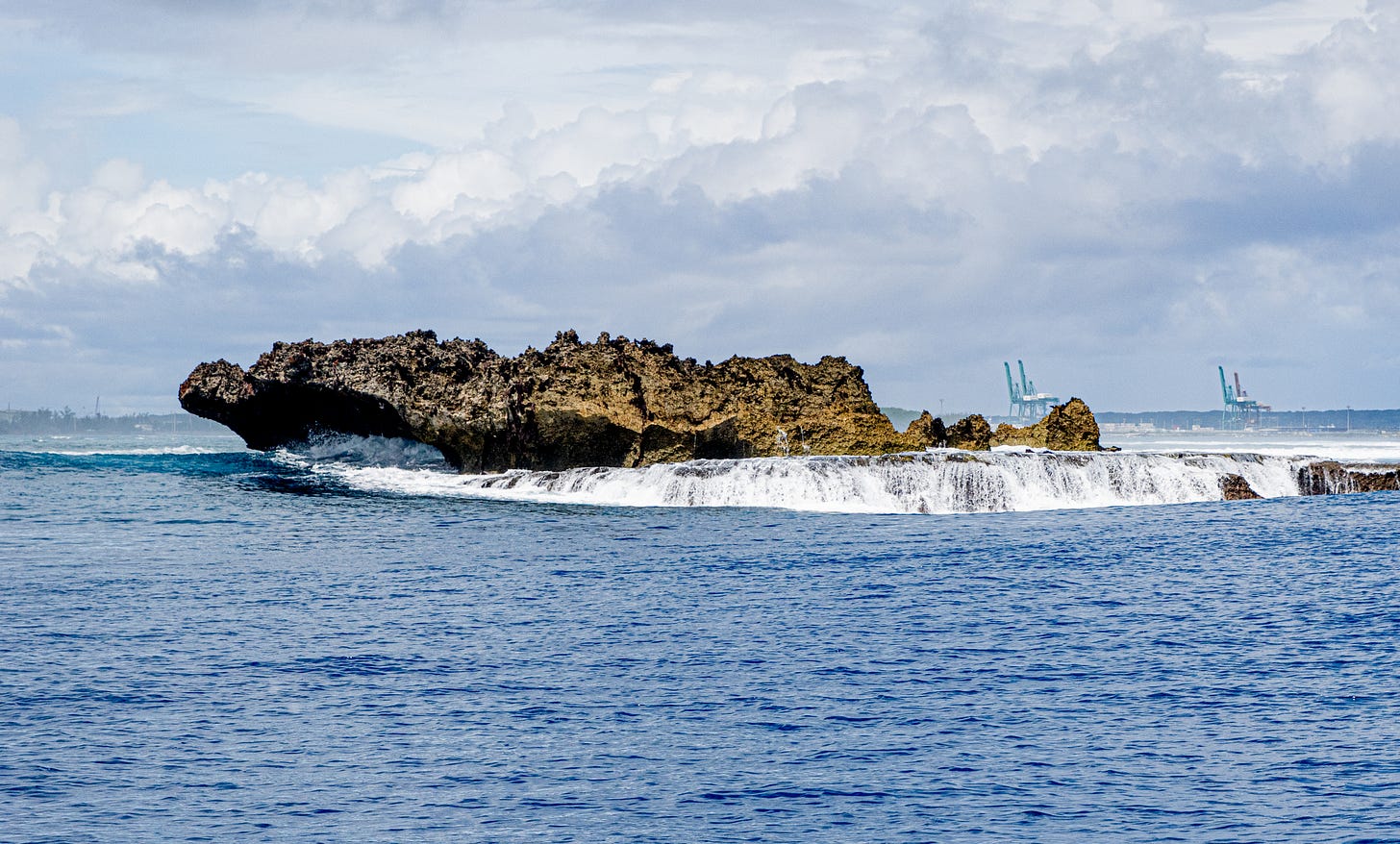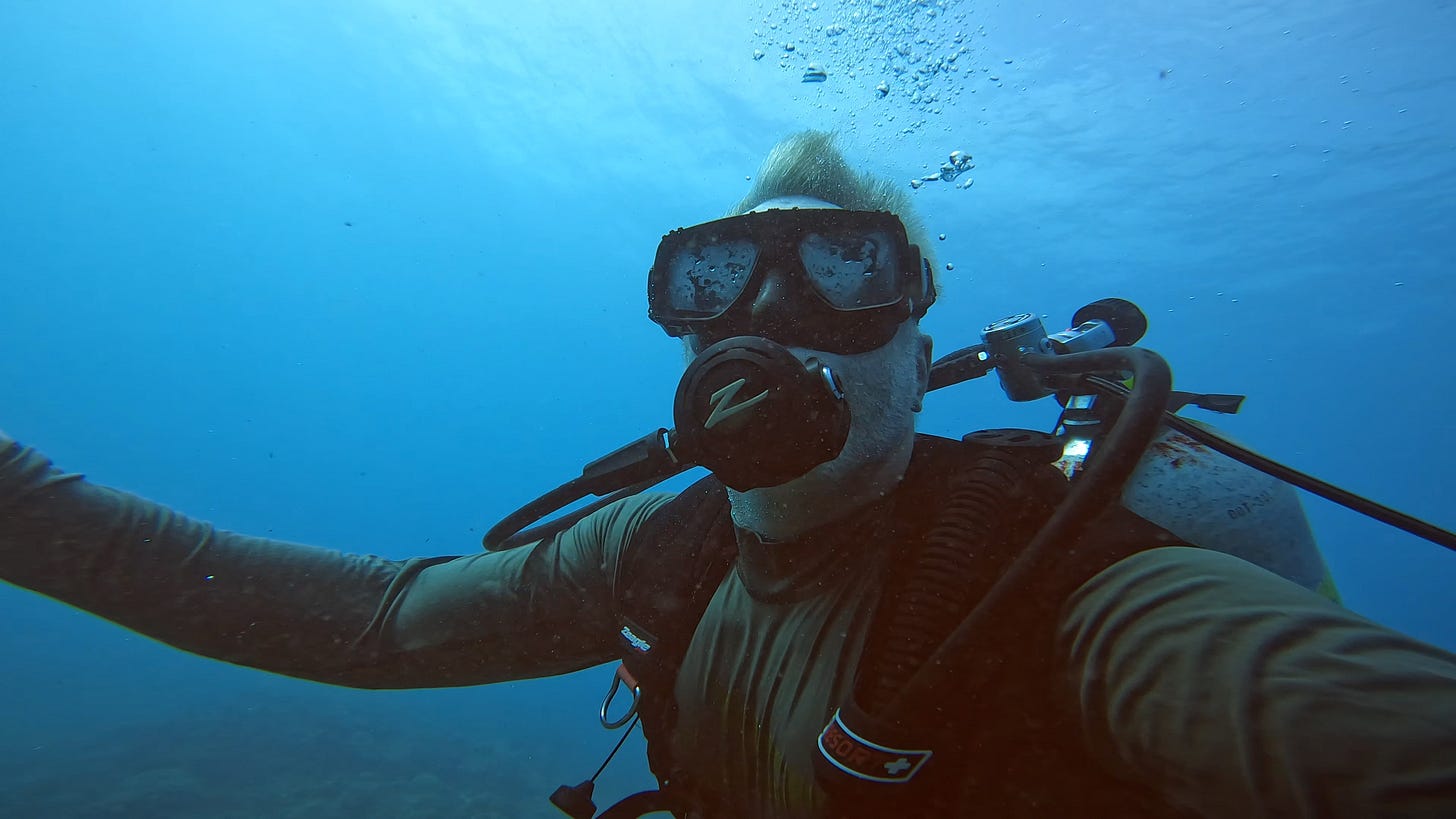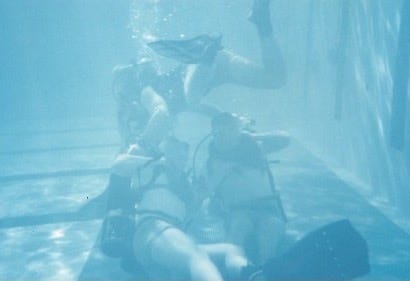Think.

This is my first dispatch from Guam where my buddy Russell Worth Parker and I are working with a team of underwater archaeologists from the National Park Service and National Oceanic Atmospheric Administration searching previously identified magnetic anomalies looking for artifacts from WWII. Each morning at 8:00 we gather in the living room of a rented townhouse and find seats on couches and kitchen chairs. The chatter and jokes stop when Anne Wright, the principal investigator from NPS Submerged Resources Center takes her place. She covers the day’s dive plan listing who will be on each boat, the destinations, and potential targets we will explore. After an opportunity for questions, Mikey from NOAA goes over the dive safety plan, assigning a Green, Amber, or Red to each aspect of the dive based on conditions and the associated operational risk.
Even for these seasoned divers, it is important to thoroughly review the plan.
There is a saying in the diving community that was beaten into my head as USMC Recon Divers: Plan the dive, dive the plan.
Adhering to a plan takes the guesswork out of the mission. You plan under the best of conditions. It is far more challenging to communicate and try to decide what to do once you are below the surface.
Our mission on the day I took the photo above was to search and catalog a large cluster of magnetic anomalies we believed were UXO, or Unexploded Ordinance left over from the battle.
After several dives in the vicinity of Camel Rock under deteriorating conditions, Anne made the call (based on the plan), to move to another location. As divers, we wanted to keep pushing, to find, photograph, and catalog the UXO, even as it was becoming unsafe to do so.
It can be easy to push too far unless you have a well-thought-out plan with appropriate go/no-go criteria.
Planning can also prepare us mentally for the challenges and tough calls ahead. During planning, we review and rehearse emergency action procedures. Knowing what to do when something goes wrong greatly increases the chances of coming out of the situation ok.
No plan will ever be perfect, but a solid plan provides a framework to adjust from.
Planning isn’t only about making sure that you don’t overextend yourself. It can also keep us on track when we consider short-changing ourselves.
If you planned to run or ruck five miles, it can be easy to consider calling it quits after four. There will always be a million good reasons to do less: you’re tired, or sore, it’s hot, your feet hurt, or you have an important engagement.
You planned the dive, now dive the plan.
Read. Sapiens
By Yuval Noah Harari
This is a super-interesting book covering the three revolutions that led us Homo Sapiens to where we are, the Cognitive, Agricultural, and Industrial Revolutions. It is well-written, easy to read and understand, and will (hopefully) make you think a little differently about who we are, where we come from, and where we have the potential to go.
Write.
In my forthcoming memoir, Tough Rugged Bastards I talk about how the instructors at USMC Combat Dive school worked to develop mental toughness in us through sharking. Below is a short excerpt from the book that discusses it:
We were trained to maintain equanimity, to get through situations using our head when it was possible or unrelenting violence when it was not. The ability to remain calm was instilled through stress inoculation, built into all our training. In our combat dive school, it began with an event called sharking.
We swam in two-man teams in circles along the bottom of a twenty-foot-deep saltwater pool, waiting.
Rule number one is: never leave your buddy. It comes without warning, two instructors descend from above to attack, rip your mouthpieces out, turn off the air, pull your masks away, and toss them. Saltwater burns your eyes and forces its way up your nose. They pull off your weight belts and fins and scatter them across the bottom of the pool. Then they tie your air hoses into elaborate knots and turn the air back on which pressurizes the hose. It stiffens, tightening the knots.
Rule number two is: never lose your air tanks. They pull at the straps and try to tear them away as you tumble across the bottom. You’re screwed if you lose them, so you grip the nylon straps with all your might, curl up in a ball and take your beating, holding your breath and waiting for it to stop.
Finally, it does–this is the crucial time. You choke back panic. White sparkles appear at the corners of your eyes. You know these come first, soon your vision will begin to tunnel, the blackness collapsing from the periphery inward until you black out, but you resist the urge to bolt for the surface. You can see it, the light above, but that would mean failure. You focus on the problem and do the counterintuitive: feel for the knob at the top of the air tank and turn it off, follow the tangled knotted hose with your hand until you reach the regulator, put the snarled mouthpiece in your mouth and expel the little air remaining in your burning lungs to clear it. You suck in water and get a half breath from the knotted hose, and that releases the pressure. Now you can work to untie the knots; your chest is heaving. Carbon Dioxide sits like a burning black weight in your lungs. You fumble with tingling fingers to get purchase on the slick rubber of the hose until the knots are cleared. Now you can turn the air back on; now you can breathe.
With the first deep breath, the encroaching blackness vanishes. Breathing steadies and slows. Now you can figure out what you need to do next: find your mask, put it on, tilt your head back and press the top of the mask tight against your forehead, exhale through your nose to clear the water out, find your fins, put them on, your weight belt, get your tank straps back around your shoulders, then see if you can help your buddy. It sucks bad, but each time you’re more confident in your ability to save yourself. The message is clear, take one problem at a time, solve it, then move to the next. I kept the poem If by Rudyard Kipling taped to my mirror during Dive School:
If you can keep your head when all about you
Are losing theirs and blaming it on you,
If you can trust yourself when all men doubt you,
But make allowance for their doubting too…
You need to keep your head to keep control of your breathing. When the fight or flight response kicks in if you can control your breathing, you can control your heart rate and then you can control your thinking when things suddenly go to shit. The amygdala and the hypothalamus sit in the middle of the brain. When the amygdala is alerted to a potentially dangerous situation, it calls on the hypothalamus to produce a chemical cocktail that stimulates the adrenal glands into releasing cortisol and adrenaline into the bloodstream. Cortisol increases the glucose in the blood, hyper-fueling muscle, and feeding the brain. Adrenaline spikes the heart rate, increasing respiration in an attempt to take in more oxygen. Blood shunts away from the extremities and gets stored in large muscles preparing the body to either fight or flee. Pupils dilate to take in more light, but that makes it difficult to focus. Fine motor skills deteriorate impacting hand-eye coordination. For the uninitiated, this series of survival mechanisms can seem catastrophic allowing fear to spawn panic. When this happens, the three things we needed to do most precisely: think, see, and shoot, become nearly impossible.
Look for Tough Rugged Bastards in bookstores this fall or early 2024.
Operation Forager II is being brought to you by:
Repeat.
Words of wisdom from Mr. Jimmy Buffett:
Whenever I’m traveling somewhere warm, Jimmy always provides the soundtrack.
“I’d rather die while I’m living than live while I’m dead. ”
“I can’t change the direction of the wind, but I can adjust my sails to always reach my destination.”
“Searching is half the fun. Life is more manageable when thought of like a scavenger hunt as opposed to a surprise party.”
“Go fast enough to get there, but slow enough to see.”
Thanks for reading Think. Read. Write. Repeat. See you next Thursday!















I wrote a comment and it posted in the Reading is Fundamental thread. It brings me joy when your posts hit my inbox. I love that you are living a life worth reading about.
Great article John! I look forward to reading “Tough Rouged Bastards”